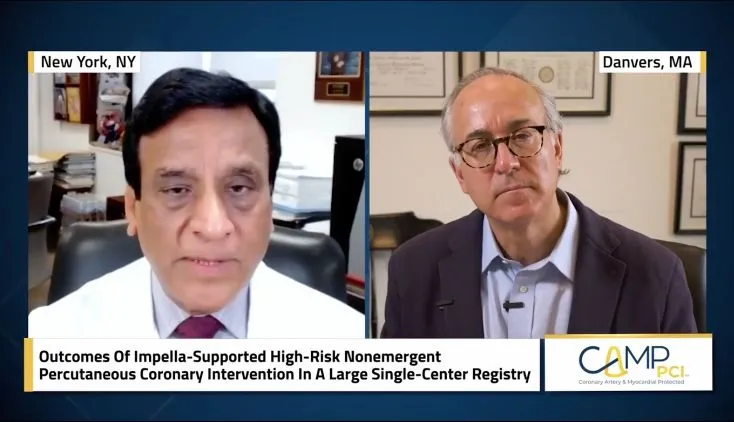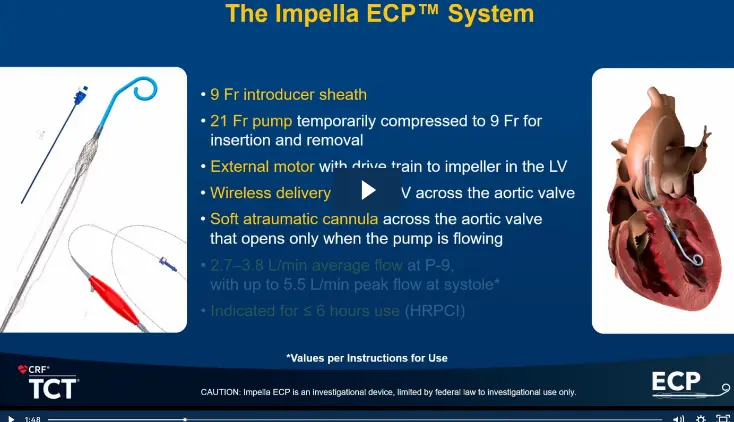Clinical Research & Data, Protected PCI
HFSA 2021: MCS in High-Risk PCI Evidence from PROTECT II through PROTECT IV
Gregg Stone, MD, presents the potential benefits from temporary mechanical circulatory support (MCS) during high-risk percutaneous coronary intervention (HRPCI) and reviews supporting evidence from observational and randomized controlled trials (RCTs). He also discusses the PROTECT IV RCT currently underway. Dr. Stone, professor of medicine and director of academic affairs from Mount Sinai Heart System in New York, is principal investigator for PROTECT IV. He gave this presentation virtually at the 2021 Heart Failure Society of America (HFSA) scientific meeting.
Dr. Stone begins by describing the potential benefits of MCS for HRPCI. Hemodynamic support, he explains, not only has the potential to reduce procedural complications and improve early outcomes, but has the potential to enable optimal lesion selection, stent implantation, and complete revascularization and thus the potential to improve late outcomes. He also describes the recent hypothesis that MCS may have renal protective effects, reducing acute kidney injury and fostering long-term renal preservation.
He notes, however, that the evidence for MCS in HRPCI is “really pretty scant” with only 2 randomized controlled trials: BCIS-1 and PROTECT II. There is observational data—including IMP-IT (Impella in Italy), USpella Registry, PROTECT II post-approval US Impella Registry, and the cVAD Registry—but he notes “it’s hard to make that much of it absent control arms.”
With regard to what the guidelines say, Dr. Stone explains “in the United States, the last guidelines that even mention mechanical circulatory support in high-risk PCI were from 2011… So, we’re basically in a guideline-free zone.”
Dr. Stone reviews data which demonstrates that while high-risk PCI is increasing over time, most of it is not done with MCS. “So, this certainly shows that the lack of important evidence has led to the lack of use of these devices. And until we have really good randomized trial evidence, we won’t know if the risks and cost of these devices are warranted and overcome by improved early and late clinical outcomes.”
“So, with this in mind,” Dr. Stone continues, “we have designed and recently started the PROTECT IV trial.” He reviews the study design and explains that the hypothesis is that by providing hemodynamic stability during high-risk, complex PCI, Impella® will facilitate improved stent optimization and more complete revascularization that will translate into improved early and late outcomes. In addition to the primary endpoint of composite rate of all-cause death, stroke, durable LVAD implant or heart transplant, large MI or CV hospitalization at 3 years, Dr. Stone explains, “We’ll have a lot of very interesting sub-studies in this trial including the use and insights gained from right heart catheterization; a very detailed renal function randomized trial where we will be collecting creatinines every single day through 7 days; and then an important viability substudy with cardiovascular magnetic resonance (CMR) obtained at baseline and 6 months to see if we should be revascularizing viable or nonviable segments as part of the revascularization approach.”
“We’re tremendously excited about PROTECT IV,” Dr. Stone concludes, “and hopefully within 3 to 4 years we’ll be able to bring you what will likely be the most substantive and robust answer to the question: ‘Should be we using potent mechanical circulatory support during high-risk PCI?’”
NPS-2361


